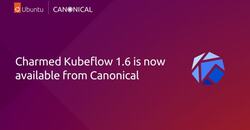Kubeflow 1.6 (UPDATED)
-
Charmed Kubeflow 1.6 is now available from Canonical | Ubuntu
Canonical, the publisher of Ubuntu, announces today the release of Charmed Kubeflow 1.6, an end-to-end MLOps platform with optimised complex model training capabilities. Charmed Kubeflow is Canonical’s enterprise-ready distribution of Kubeflow, an open-source machine learning toolkit designed for use with Kubernetes.
Charmed Kubeflow 1.6 follows the same release cadence as the Kubeflow upstream project. This latest version follows the Kubeflow roadmap and comes with performance enhancements and more advanced model training capabilities.
-
Canonical adds new data processing and model tracking features to Charmed Kubeflow MLOps platform - SiliconANGLE
Canonical adds new data processing and model tracking features to Charmed Kubeflow MLOps platform
UPDATE
Sean Michael Kerner covers it todat.
-
Kubernetes ML optimizer, Kubeflow, improves data preprocessing with v1.6 | VentureBeat
More often than not, when organizations deploy applications across hybrid and multicloud environments, they use the open-source Kubernetes container orchestration system.
Kubernetes itself helps to schedule and manage distributed virtual compute resources and isn’t optimized by default for any one particular type of workload, that’s where projects like Kubeflow come into play.
For organizations looking to run machine learning (ML) in the cloud, a group of companies including Google, Red Hat and Cisco helped to found the Kubeflow open-source project in 2017. It took three years for the effort to reach the Kubeflow 1.0 release in March 2020, as the project gathered more supporters and users. Over the last two years, the project has continued to evolve, adding more capabilities to support the growing demands of ML.
Another day, more from Canonical today.
-
Charmed Kubeflow 1.6: what’s new? | Ubuntu
Kubeflow 1.6 was released on September 7, and Charmed Kubeflow 1.6 (Canonical’s distribution) came shortly after, as it follows the same roadmap. Charmed Kubeflow introduces a new version of Kubeflow pipelines as well as model training enhancements.
[...]
Metadata is a project that is used to better track and manage machine learning workflows. It provides information about runs, models, datasets and data artefacts, enabling users to monitor and understand their artificial intelligence projects. However, in the previous versions of Kubeflow, machine learning engineers had to manually configure it to benefit from this feature, which was often challenging. Moreover, they could not log additional metadata or use any metadata in downstream components. Kubeflow 1.6 changes the asynchronous process implementation that the metadata project had. It offers more assurance that the metadata is captured and recorded, regardless of the deployment step. The metadata is now sourced from the pipeline execution cache. KFP concepts are used to capture the metadata instead of the Pod spec.

